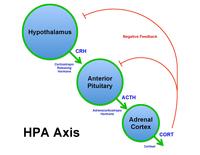
Photo from wikipedia
&NA; Psychosocial stress leads to the activation of kappa opioid receptors (KORs), which induce dysphoria and facilitate depression‐like behaviors. However, less is known about the long‐term effects of stress and… Click to show full abstract
&NA; Psychosocial stress leads to the activation of kappa opioid receptors (KORs), which induce dysphoria and facilitate depression‐like behaviors. However, less is known about the long‐term effects of stress and KORs in females. We examined the long‐term effects of social defeat stress on the aversive properties of KOR activation in male and female California mice (Peromyscus californicus) using a conditioned place aversion paradigm. Female California mice naïve to social defeat, formed a place aversion following treatment with 2.5 mg/kg of the KOR agonist U50,488, but females exposed to defeat did not form a place aversion to this dose. This supports the finding by others that social defeat weakens the aversive properties of KOR agonists. In contrast, both control and stressed males formed an aversion to 10 mg/kg of U50,488. We also examined EGR1 immunoreactivity, an indirect marker of neuronal activity, in the nucleus accumbens (NAc) and found that stress and treatment with 10 mg/kg of U50,488 increased EGR1 immunoreactivity in the NAc core in females but reduced activation in males. The effects of stress and U50,488 on EGR1 were specific to the NAc, as we found no differences in the bed nucleus of the stria terminalis. In summary, our data indicate important sex differences in the long‐term effects of stress and indicate the need for further study of the molecular mechanisms mediating the behavioral effects of KOR in both males and females. HighlightsLow dose of kappa opioid receptor agonist induced aversion in control, but not stressed, females.High dose of kappa opioid receptor agonist induced aversion in control and stressed males.Stress and kappa agonist increased EGR1 activity in the nucleus accumbens in females.
Journal Title: Behavioural Brain Research
Year Published: 2017
Link to full text (if available)
Share on Social Media: Sign Up to like & get
recommendations!